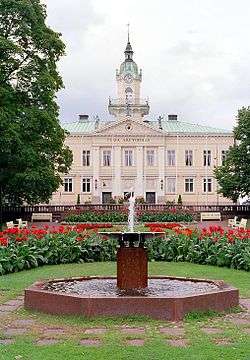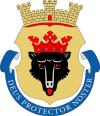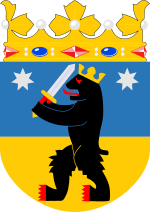Pori
| Pori Pori – Björneborg | ||
|---|---|---|
| City | ||
| Porin kaupunkiBjörneborg stad | ||
|
The old Town Hall of Pori | ||
| ||
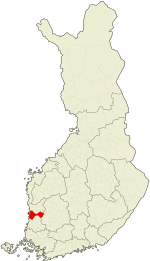 Location of Pori in Finland | ||
| Coordinates: 61°29′N 021°48′E / 61.483°N 21.800°ECoordinates: 61°29′N 021°48′E / 61.483°N 21.800°E | ||
| Country | Finland | |
| Region | Satakunta | |
| Sub-region | Pori sub-region | |
| Charter | 1558 | |
| Government | ||
| • City manager | Aino-Maija Luukkonen | |
| Area (2011-01-01)[1] | ||
| • Total | 1,704.07 km2 (657.95 sq mi) | |
| • Land | 834.06 km2 (322.03 sq mi) | |
| • Water | 870.01 km2 (335.91 sq mi) | |
| Area rank | 57th largest in Finland | |
| Population (2016-03-31)[2] | ||
| • Total | 85,256 | |
| • Rank | 11th largest in Finland | |
| • Density | 102.22/km2 (264.7/sq mi) | |
| Population by native language[3] | ||
| • Finnish | 98% (official) | |
| • Swedish | 0.5% | |
| • Others | 1.5% | |
| Population by age[4] | ||
| • 0 to 14 | 15% | |
| • 15 to 64 | 65.2% | |
| • 65 or older | 19.8% | |
| Time zone | EET (UTC+2) | |
| • Summer (DST) | EEST (UTC+3) | |
| Municipal tax rate[5] | 18.75% | |
| Climate | Dfc | |
| Website | www.pori.fi | |
Pori (Swedish: Björneborg, Latin: Arctopolis) is a city and municipality on the west coast of Finland. The city is located some 10 kilometres (6 mi) from the Gulf of Bothnia, on the estuary of the Kokemäenjoki river. Pori was established in 1558 by Duke John who became later John III of Sweden.
The municipality has a population of 85,256 (31 March 2016)[2] and covers an area of 1,704.07 square kilometres (657.95 sq mi) of which 870.01 km2 (335.91 sq mi) is water.[1] The population density is 102.22/km2 (264.7/sq mi). The municipality is unilingually Finnish. It is the 11th largest city in Finland, and the 7th largest urban area. Pori is also the capital of the Satakunta region (pop. 224,028) and the Pori sub-region (pop. 136,905).[6]
Name
The name Pori comes from the -borg part (meaning city or castle) of the original name in Swedish with a Fennicised pronunciation.[7] The Swedish name Björneborg means Bear City (Bear Castle), and the Latin-Greek Arctopolis also means Bear City.
History
Early years
City of Pori was established in 1558 by Duke John of Finland (Finnish: Juhana III or Juhana-herttua) who was later known as John III of Sweden. It was a successor to the medieval towns of Teljä (Kokemäki) and Ulvila. Sailing the Kokemäki river had become more and more difficult since the 14th century due to the post-glacial rebound. The importance of Kokemäki and Ulvila began to decline as the ships could no longer navigate the river. In the 16th century the situation had become so bad that Duke John decided to establish a new harbour and market town closer to the sea.
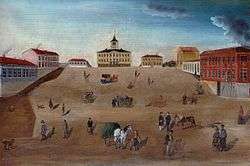
The Bourgeois of Ulvila were ordered to migrate to the newly founded city and on 8 March 1558 John III gave the charter of Pori, which read: "Because we have seen that it would be best to build a strong market town alongside the sea, and because we cannot find anywhere suitable for fortifying in Ulvila, we have chosen another location at Pori."[8]
At the beginning Pori had around 300 involuntary residents. However, they soon recognized the advantages of their new location, which offered opportunities for profitable trading, among other things. Ship building has been important since the beginning of history of Pori. Shipyard started by the river in 1572 and it worked until the early 20th century. The biggest ship probably ever built in Pori was "Porin Kraveli", completed in 1583.
Greater Wrath and Crimean War
During the Greater Wrath in 1713 Pori was occupied by Russian troops. Eight Russian regiments spent four months in town from September 1713 to January 1714 vandalizing and demolishing the city. Some of the most wealthiest residents vanished, they were probably imprisoned and taken to Russia. Wind mills and storage houses were burnt. Most of the oxen and horses and more than 400 boats were lost. The Russian invasion of Finland continued another seven years. It meant great financial loss for Pori as the foreign trade was completely finished. After the Greater Wrath Pori lost its staple rights and the city went into deep depression. A new "golden age" for Pori started in 1765 as the city got back the staple rights for foreign trade.[9]
As the Crimean War burst out in 1853 Pori was attacked by French and British navy in 1855. The French frigate D'Assos made the first attempt on July and managed to catch one ship outside the Isokari island before they sailed further north. Another attack was made by British fleet on 9 August. Mayor Klaus Wahlberg negotiated a deal with the enemy and the city was saved. Two sailing ships and 17 smaller boats along with some other properties were given to the British.[10]
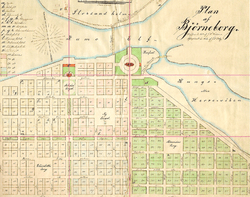
City fires
As most of its houses were made of wood, Pori has had its share of fires. The town has burned down and been rebuilt nine times. The city was first destroyed by fire in 1571 and the last major fire was in 1852. More than 75 per cent of the city was destroyed in 1852 and most of the residents became homeless. Only a few buildings, such as the Town Hall, were saved. The Great Fire of 1852 was one of the worst disasters in Finland so far. The new city plan and the shape of the present old town was designed by Swedish architect C. T. von Chiewitz. The newly completed buildings, such as the Pori Theatre and Hotel Otava are historically and culturally important. Four esplanades, which are wider than the other streets, divided the new city center in four parts.
Finnish Civil War and World War II
During the 1918 Finnish Civil War Pori was a part of the Finnish Socialist Workers' Republic. The city was not on the direct war zone but some terror was made by both sides. The best known incident was the execution of 11 Whites at the schoolyard of Pori Lyceum.
At the World War II Pori was bombed four times by the Soviet Airforce in 1939–1940. The worst bombing occurred on 2 February 1940 as 21 people were killed. Most of the bombs were aimed to the harbour area instead of the city itself.[11] From 1942 to 1944 Pori Airport served as an air depot for the Jagdgeschwader 5 of German Luftwaffe.[12] Pori air depot was known as "Feldluftpark Pori" and it was one of the major German air depots in Northern Europe. On September 1944 Germans left the airport and destroyed most of their facilities by exploding. One German-built hangar is still used today. Total of 319 Soviet Red Army prisoners of war died in Pori as they were used as a forced labor by the Germans. Soviet soldiers are buried at Vähärauma district in the eastern part of the city.[13]
Geography
River and delta
The geological uplift after the last ice age has been relatively high at the mouth of the Kokemäenjoki river. When the city was established in 1558, it was situated on the shore of Pori bay. Because of this uplift the delta of the river now begins in front of the city. The recreation area of Kirjurinluoto is actually on an island connected with bridges to the mainland. Pori National Urban Park preserves the story of the phases of development of the town born at the mouth of the river Kokemäenjoki.
Climate
| Climate data for Pori | |||||||||||||
|---|---|---|---|---|---|---|---|---|---|---|---|---|---|
| Month | Jan | Feb | Mar | Apr | May | Jun | Jul | Aug | Sep | Oct | Nov | Dec | Year |
| Average high °C (°F) | −3 (27) |
−3 (27) |
1 (34) |
8 (46) |
14 (57) |
19 (66) |
21 (70) |
20 (68) |
14 (57) |
8 (46) |
2 (36) |
−1 (30) |
8.3 (47) |
| Average low °C (°F) | −8 (18) |
−9 (16) |
−5 (23) |
−1 (30) |
4 (39) |
9 (48) |
12 (54) |
10 (50) |
6 (43) |
3 (37) |
−2 (28) |
−5 (23) |
1.2 (34.1) |
| Average precipitation mm (inches) | 26.6 (1.047) |
20.7 (0.815) |
24.1 (0.949) |
20.6 (0.811) |
20.0 (0.787) |
36.9 (1.453) |
36.2 (1.425) |
42.5 (1.673) |
35.5 (1.398) |
37.4 (1.472) |
29.6 (1.165) |
30.2 (1.189) |
360.3 (14.184) |
| Source: Foreca | |||||||||||||
Politics
The largest parties in Pori are National Coalition Party and Social Democratic Party. In 2012 municipal elections the parties gained 26.6% and 26.3% of vote, respectively. The mayor of Pori is Aino-Maija Luukkonen, who was elected to run the city in 2004 after the former mayor, Martti Sinisalmi, retired from the post.
Transport
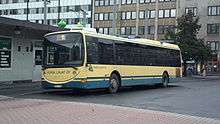
Pori railway station and bus station are located in the city center. Since the Pori station is a terminal train station, railway traffic is quite moderate. Pori is only connected to Tampere with 13 daily departures by the Tampere–Pori railway. Bus traffic is very busy instead. Pori has more than 100 intercity buses with major Finnish cities Helsinki, Turku and Tampere as well as smaller places like Rauma and Vaasa. Public transport is managed by the city owned bus company Porin Linjat. It has also service to nearby municipalities.
Pori Airport has daily connections to Helsinki Airport and seasonal flights to ski resorts of Lapland as well as charter flights to several Mediterranean countries. Scheduled flights to Swedish capitol Stockholm were ceased in early 2013.
Port of Pori is specialized on bulk cargo. It has liner service to several Northern European ports. In October 2013 Pori was the destination of MS Nordic Orion, the first commercial cargo ship ever to transit the Northwest Passage. She was carrying a cargo of coking coal from Port Metro Vancouver, Canada.[14]
Education
Pori is the home of 28 comprehensive schools and 7 gymnasiums including English, French and German classes as well as the Swedish-speaking Björnebogs svenska samskola, Rudolf Steiner School and a Christian school.[15] First Trivial school in Pori was founded in 1641. Today it is succeeded by Pori Lyceum established 1879.[16] Vocational education is given in five institutes[15] including the music school Palmgren Conservatory[17] and Finnish Aviation Academy[18] which is owned by the state of Finland and Finnish flag carrier airline Finnair.
Highest grades of education in Pori are the Satakunta University of Applied Sciences and University Consortium of Pori (UCPori).
Culture
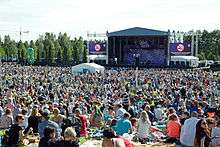
Pori Jazz Festival
Pori is widely known for its international jazz music festival, established in 1966. Today Pori Jazz is one of the major jazz festivals in Europe as well as one of the largest culture events in Finland. The nine-day festival is held annually in July.[19] Many renowned musicians have played the festival over the years, including artists like B. B. King, Ray Charles, Miles Davis, Keith Jarrett, Bob Dylan, Elton John, Kanye West and Santana.[20]
Concert arenas are located around the city. Main venue is Kirjurinluoto Arena, which is an open-air concert park holding an audience more than 30,000. The arena has hosted also many other events like Sonisphere Festival in 2009 and 2010. SuomiAreena in an international public debate forum held simultaneously with Pori Jazz.[21]
Theatre and music
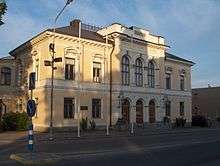
Pori is considered to be the birthplace of Finnish-language theatre as the Finnish National Theatre gave its first performance at Hotel Otava on October 13, 1872. Pori Theatre is a municipal theatre established in 1931 as a merger of two local stages. Theatre building was completed in 1884. Another professional theatre in Pori is Rakastajat-teatteri. It is also hosting an annual festival for independent theatre groups.[22] Pori is a home for several amateur and youth theatres and the Kirjurinluoto Summer Theatre that presents open-air productions in summertime.
Pori Symphony Orchestra was established 1938 and it is today known as Pori Sinfonietta. The orchestra performs in 1999 built Promenadikeskus music hall. The first city orchestra was founded in 1877. In its early years the orchestra was mostly performing light orchestral music and its musicians were German. The very first symphony concert was played in 1902. Most famous classical composer from Pori is Selim Palmgren, even called as "The Finnish Chopin". Pori Opera was established in 1976. It performs a yearly production together with Pori Sinfonietta and Pori Opera Choir. In 2004 they recorded Kung Karls jakt which is the first opera composed in Finland.
Museums
Satakunta Museum is a historical museum established 1888. It is one of the oldest historical museums in Finland and presents the history of Satakunta province and the city of Pori. Museum building was completed in 1973.[23] Pori Art Museum is a museum of contemporary and modern art. It was opened in 1979. Museum is based on the collections of local art collector and patronage Maire Gullichsen. Pori Art Museum is located in a former weigh house originally built in 1860.[24] Other museums in Pori are the Rosenlew Museum which is presenting the industrial heritage of Rosenlew Company[25] and the natural history museum Luontotalo Arkki.[26] Toivo is the renovation center of Satakunta Museum. It presents traditional ways of restoring wooden houses with an exhibition of typical early 1900s home.[27]
Sports
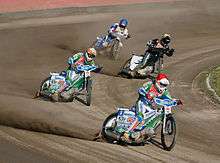
Major team sports in Pori are ice hockey and football. Pori is especially known for its popular hockey team Ässät which is a three-time Finnish Champion, most recently in 2013.[28] Their victory parade gathered some 20,000 people to the Pori market square.[29] Local top football side FC Jazz have won the Finnish premier league Veikkausliiga in 1993 and 1996. The club has also competed in several UEFA competitions. FC Jazz currently plays in the second tier Ykkönen.[30] Women's football side NiceFutis is competing in the top division Naisten Liiga.
Other popular team sports in Pori are bandy and pesäpallo, the Finnish version of baseball. Women's pesäpallo team Pesäkarhut and bandy side Narukerä are both playing in the premier divisions. Pori has also male or female teams of lower divisions in almost all major team sports, including clubs like Musan Salama (football), Pori Futsal (futsal), Bears (American football), Pori Rugby (rugby union) and Karhut (floorball). The oldest sportsclub in Finland, Segelföreningen i Björneborg was established 1856 in Pori.[31]
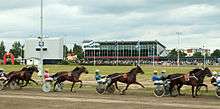
Most successful Pori athletes are Olympic gold medal winners Kelpo Gröndahl and Kaarlo Kangasniemi. Other Olympic medalists from Pori are Arvo Aaltonen, Jouni Grönman, Jyri Kjäll and Sari Fisk. Today the best known athletes are swimmer Matti Mattsson, hurdler Nooralotta Neziri and Paralympic gold medalist Leo-Pekka Tähti. Mikko Salo won the 2009 CrossFit Games in Aromas, California and was declared as "World's Fittest Man".[32]
Sporting facilities
12,300 seated Pori Stadium, which is primarily used for football, is one of the largest multi-purpose stadiums in Finland. It is the home ground for FC Jazz and NiceFutis. Stadium has also been a venue for two Finland internationals. Pori Stadium has hosted the Finnish Championships in Athletics three times and will be the venue of 2015 games.
Stadium is located at the Isomäki sports center. The area includes several other facilities like ice hockey arena for 6,500 spectators, indoor football arena, rink for bandy and skating, tennis courts and outdoor swimming stadium. Pori Racetrack is one of the major horse racing venues in Finland. Speedway track for motorcycles is located in the Yyteri area 20 kilometres out of the city as well as Yyteri Golf.[33] The other golf course, Pori Golf Club, is on the outskirts of city.[34]
The new city owned indoor swimming pool was opened in September 2011. It is a modern facility with seven pools of variable depth and size, three saunas and a gym.[35]
Media
The most widely read daily newspaper of Pori area is the independent Satakunnan Kansa. Other local papers are the Social Democrat Uusi Aika and Satakunnan Työ which is aligned with the Left Alliance. They are both published weekly as well as several free newspapers.
Radio Pori is a radio station established in 1985 as one of the first commercial stations in Finland. Eazy 101 is a local radio station mainly for younger people under 30. Public service radio in Pori area is Yle Satakunta, a regional station of Yle Radio Suomi. Yle TV2 screens daily local news from the Pori region and Satakunta province on its national channel.
Points of interest
Yyteri Beach is located 17 kilometres out of the city center. The six-kilometre-long beach is one of the largest in Baltic Sea. Part of the area designated as a unisex nudist beach. Tourist facilities in Yyteri include a hotel/spa, camping/caravan park and a golf course. It is also very popular among windsurfers.[36] Island of Reposaari is located some 10 kilometres further of Yyteri. It is connected with the mainland by highway. Reposaari is a unique village with a townscape of mostly wooden buildings and a population of 1,000 people. The island has a church, marina, hostel, camping site, several restaurants and a fishing port.[37]
Juselius Mausoleum at the Käppärä Cemetery was built in 1901 for the 11-year-old daughter of businessman Fritz Arthur Jusélius. It is the only mausoleum in Finland. The building is decorated with a frescoes by Akseli Gallen-Kallela who is one of Finland's most prominent painters. Kirjurinluoto is an island and park at the delta of river Kokemäenjoki by the city center. On the south side of the river stand the Empire style buildings of the "old town", raised after the 1852 city fire. 1841 built Old Town Hall is one of the few buildings saved from the fire. Central Pori Church and the Greek Orthodox Church of Pori dedicated to John the Theologian are the most notable churches.[36] 10 kilometres outside the city at the municipality of Ulvila are the Medieval St. Olaf's Church and the 18th century ironworks of Leineperi.
Villa Mairea is a design of Finland's most famous architect Alvar Aalto. It is considered as one of his most significant works. The villa is widely known all over the world among the ones interested in modern architecture.[38] Villa Mairea is located in Noormarkku, a municipality annexed with Pori in 2010.
Demographics
More than 98% of the population has Finnish as their first language, and about 2% has either Polish, Estonian, German, Russian or Swedish as their first language. There is a small minority of about 0.5% of Swedish speakers in the city.[3] There is a Swedish School and a Swedish Culture Club that are aimed at serving the Finland-Swedish minority in the Satakunta region.
Population development
The significant population increase in 1950 was the result of annexing nearby areas. Population peaked in the mid-1970s, when it was over 80 000. After that the population declined, and in recent years has remained steady at just over 83 000. After the annex of the neighbouring municipality Noormarkku in 2010 the population rose to the current level.
In 1952 Pori was the fifth largest city in Finland after Helsinki, Turku, Tampere and Lahti.[39]
|
|
|
|
|
- Source[41]
Notable people
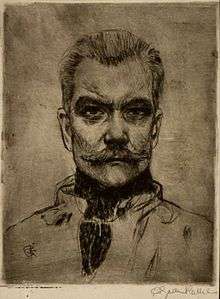
Arts, music and society
- Antti Ahlström - businessman
- Cecilia Blomqvist - deaconess
- Elin Danielson-Gambogi - painter
- Akseli Gallen-Kallela - painter
- Maire Gullichsen - art collector and patronage
- Jenni Haukio - poet and the spouse of the President of Finland
- Juha Janhunen - linguist
- Aurora Karamzina - philanthropist and supporter of charities
- Selim Palmgren - composer
- Jorma Uotinen - dancer and choreographer
Sports
- Kelpo Gröndahl - Olympic gold medalist 1952 and member of parliament
- Timo Furuholm - footballer
- Jesse Joensuu - ice hockey player
- Kaarlo Kangasniemi - Olympic gold medalist 1968
- Pekka Rautakallio - ice hockey coach and former player
- Antti Sumiala - footballer
- Leo-Pekka Tähti - paralympian
- Erik Haula - ice hockey player
Music groups
- Appendix
- Circle
- Circle Of Contempt
- Deep Turtle
- Dingo
- Magyar Posse
- Mors Principium Est
- Yö
International relations
Twin towns – Sister cities
Pori is twinned with:
 Bremerhaven, Germany, since 1967
Bremerhaven, Germany, since 1967 Eger, Hungary, since 1973
Eger, Hungary, since 1973 Kołobrzeg, Poland, since 1975
Kołobrzeg, Poland, since 1975 Mâcon, France, since 1990
Mâcon, France, since 1990 Porsgrunn, Norway, since 1956
Porsgrunn, Norway, since 1956 Riga, Latvia, since 1965[42]
Riga, Latvia, since 1965[42] Stralsund, Germany, since 1968
Stralsund, Germany, since 1968 Sundsvall, Sweden, since 1940
Sundsvall, Sweden, since 1940 Sønderborg, Denmark, since 1952
Sønderborg, Denmark, since 1952

References
- 1 2 "Area by municipality as of 1 January 2011" (PDF) (in Finnish and Swedish). Land Survey of Finland. Retrieved 9 March 2011.
- 1 2 "Ennakkoväkiluku sukupuolen mukaan alueittain, maaliskuu.2016" (in Finnish). Statistics Finland. Retrieved 31 March 2016.
- 1 2 "Population according to language and the number of foreigners and land area km2 by area as of 31 December 2008". Statistics Finland's PX-Web databases. Statistics Finland. Retrieved 29 March 2009.
- ↑ "Population according to age and gender by area as of 31 December 2008". Statistics Finland's PX-Web databases. Statistics Finland. Retrieved 28 April 2009.
- ↑ "List of municipal and parish tax rates in 2011". Tax Administration of Finland. 29 November 2010. Retrieved 13 March 2011.
- ↑ Statistics Finland Retrieved 7 February 2015.
- ↑ Peter Slotte (16 January 2007). "Paikannimet kahdella kielellä – pitkä kulttuuriperinne" (in Finnish). Kotimaisten kielten tutkimuskeskus. Retrieved 6 March 2009.
- ↑ J.W., Ruuth (1958). "Kaupungin perustamiskirje". Porin kaupungin historia II (in Finnish). Porin kaupunki. p. 269. Retrieved 7 March 2009.
- ↑ Pori-tieto – Isoviha (in Finnish). Retrieved 2 August 2013.
- ↑ Pori-tieto – Krimin sota ja Pori (in Finnish). Retrieved 2 August 2013.
- ↑ Porin kaupunki – 1939–1945 Sota ja teollisuus (in Finnish). Retrieved 2 August 2013.
- ↑ Lexikon der Wehrmacht (in German). Retrieved 2 August 2013.
- ↑ Finnish-Russian Association of Pori (in Finnish). Retrieved 2 August 2013.
- ↑ "How global warming has shaved 1,000 nautical miles off a shipping route: Cargo vessel becomes first to use Arctic Northwest Passage - to transport COAL". Daily Mail. 27 September 2013. Retrieved 17 November 2013.
- 1 2 Family life City of Pori. Retrieved November 16, 2013.
- ↑ Pori Lyceum Official Homepage Retrieved November 16, 2013.
- ↑ Palmgren Conservatory Official Homepage (in Finnish). Retrieved November 16, 2013.
- ↑ Finnish Aviation Academy Official Homepage Retrieved November 16, 2013.
- ↑ "Pori Jazz Festival". VisitFinland.com. Retrieved 16 September 2013.
- ↑ "HIstory of Pori Jazz". Pori Jazz. Retrieved 16 September 2013.
- ↑ What is SuomiAreena? SuomiAreena Official Homepage. Retrieved November 14, 2013.
- ↑ Rakastajat-teatteri Official Homepage Retrieved November 14, 2013.
- ↑ Satakunta Museum City of Pori. Retrieved November 14, 2013.
- ↑ Pori Art Museum Museot.fi. Retrieved November 14, 2013.
- ↑ Rosenlew Museum City of Pori. Retrieved November 14, 2013.
- ↑ The Ark Nature Centre City of Pori. Retrieved November 14, 2013.
- ↑ Satakunta Museum, Building Heritage House Toivo and The home of the Korsman Family Museums.fi. Retrieved November 14, 2013.
- ↑ "Pori Ässät take ice hockey championship". Yle News. April 25, 2013. Retrieved November 13, 2013.
- ↑ "Porin kultajuhlat sujuivat rauhallisesti" (in Finnish). Yle Uutiset. April 27, 2013. Retrieved November 13, 2013.
- ↑ "Europa League football for Vaasa in 2014". Yle News. October 20, 2013. Retrieved November 13, 2013.
- ↑ History of Segelföreningen i Björneborg (in Finnish). Retrieved November 13, 2013.
- ↑ "A Finn at the Finish". 2009 CrossFit Games. July 12, 2009. Retrieved November 13, 2013.
- ↑ Yyteri Golf Retrieved November 13, 2013.
- ↑ Pori Golf Club – Kalafornia Golfcouse Retrieved November 13, 2013.
- ↑ Keskustan uimahalli (in Finnish). The City of Pori. Retrieved November 13, 2013.
- 1 2 The Sights City of Pori. Retrieved 28 November 2013.
- ↑ Reposaaren yhdyskunta Finnish National Board of Antiquities. (in Finnish). Retrieved 28 November 2013.
- ↑ "AD Classics: Villa Mairea / Alvar Aalto". ArchDaily. October 28, 2010. Retrieved November 28, 2013.
- ↑ "Suomen kuntien väkilukutiedot 1.1.1952" Mitä missä milloin Yearbook 1954.
- ↑ Finnish Population Registry Center, 31 August 2013 Retrieved 5 December 2013.
- ↑ "Porin kaupungin tilastollinen vuosikirja 2011" (PDF) (in Finnish). Porin kaupunki. May 2011. p. 8. Retrieved 20 July 2011.
- ↑ "Twin cities of Riga". Riga City Council. Retrieved 27 July 2009.
External links
| Wikimedia Commons has media related to Pori. |
| Wikivoyage has a travel guide for Pori. |
- City of Pori – Official website
 "Björneborg". Encyclopædia Britannica (11th ed.). 1911.
"Björneborg". Encyclopædia Britannica (11th ed.). 1911.
